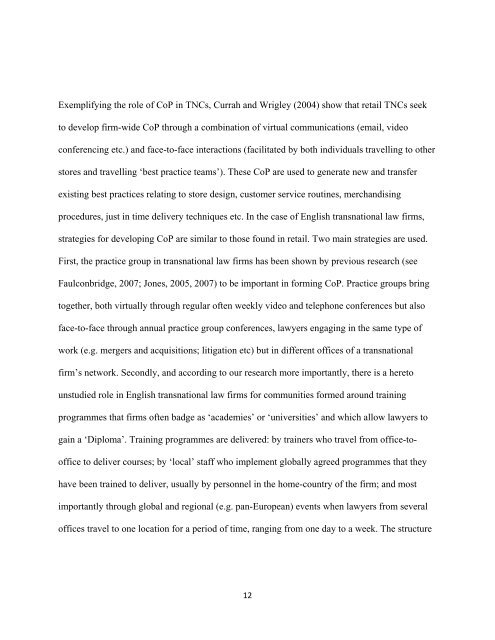Learning to be a lawyer in transnational law firms: communities of ...
Learning to be a lawyer in transnational law firms: communities of ...
Learning to be a lawyer in transnational law firms: communities of ...
Create successful ePaper yourself
Turn your PDF publications into a flip-book with our unique Google optimized e-Paper software.
Exemplify<strong>in</strong>g the role <strong>of</strong> CoP <strong>in</strong> TNCs, Currah and Wrigley (2004) show that retail TNCs seek<br />
<strong>to</strong> develop firm-wide CoP through a comb<strong>in</strong>ation <strong>of</strong> virtual communications (email, video<br />
conferenc<strong>in</strong>g etc.) and face-<strong>to</strong>-face <strong>in</strong>teractions (facilitated by both <strong>in</strong>dividuals travell<strong>in</strong>g <strong>to</strong> other<br />
s<strong>to</strong>res and travell<strong>in</strong>g ‘<strong>be</strong>st practice teams’). These CoP are used <strong>to</strong> generate new and transfer<br />
exist<strong>in</strong>g <strong>be</strong>st practices relat<strong>in</strong>g <strong>to</strong> s<strong>to</strong>re design, cus<strong>to</strong>mer service rout<strong>in</strong>es, merchandis<strong>in</strong>g<br />
procedures, just <strong>in</strong> time delivery techniques etc. In the case <strong>of</strong> English <strong>transnational</strong> <strong>law</strong> <strong>firms</strong>,<br />
strategies for develop<strong>in</strong>g CoP are similar <strong>to</strong> those found <strong>in</strong> retail. Two ma<strong>in</strong> strategies are used.<br />
First, the practice group <strong>in</strong> <strong>transnational</strong> <strong>law</strong> <strong>firms</strong> has <strong>be</strong>en shown by previous research (see<br />
Faulconbridge, 2007; Jones, 2005, 2007) <strong>to</strong> <strong>be</strong> important <strong>in</strong> form<strong>in</strong>g CoP. Practice groups br<strong>in</strong>g<br />
<strong>to</strong>gether, both virtually through regular <strong>of</strong>ten weekly video and telephone conferences but also<br />
face-<strong>to</strong>-face through annual practice group conferences, <strong><strong>law</strong>yer</strong>s engag<strong>in</strong>g <strong>in</strong> the same type <strong>of</strong><br />
work (e.g. mergers and acquisitions; litigation etc) but <strong>in</strong> different <strong>of</strong>fices <strong>of</strong> a <strong>transnational</strong><br />
firm’s network. Secondly, and accord<strong>in</strong>g <strong>to</strong> our research more importantly, there is a here<strong>to</strong><br />
unstudied role <strong>in</strong> English <strong>transnational</strong> <strong>law</strong> <strong>firms</strong> for <strong>communities</strong> formed around tra<strong>in</strong><strong>in</strong>g<br />
programmes that <strong>firms</strong> <strong>of</strong>ten badge as ‘academies’ or ‘universities’ and which allow <strong><strong>law</strong>yer</strong>s <strong>to</strong><br />
ga<strong>in</strong> a ‘Diploma’. Tra<strong>in</strong><strong>in</strong>g programmes are delivered: by tra<strong>in</strong>ers who travel from <strong>of</strong>fice-<strong>to</strong><strong>of</strong>fice<br />
<strong>to</strong> deliver courses; by ‘local’ staff who implement globally agreed programmes that they<br />
have <strong>be</strong>en tra<strong>in</strong>ed <strong>to</strong> deliver, usually by personnel <strong>in</strong> the home-country <strong>of</strong> the firm; and most<br />
importantly through global and regional (e.g. pan-European) events when <strong><strong>law</strong>yer</strong>s from several<br />
<strong>of</strong>fices travel <strong>to</strong> one location for a period <strong>of</strong> time, rang<strong>in</strong>g from one day <strong>to</strong> a week. The structure<br />
12
















